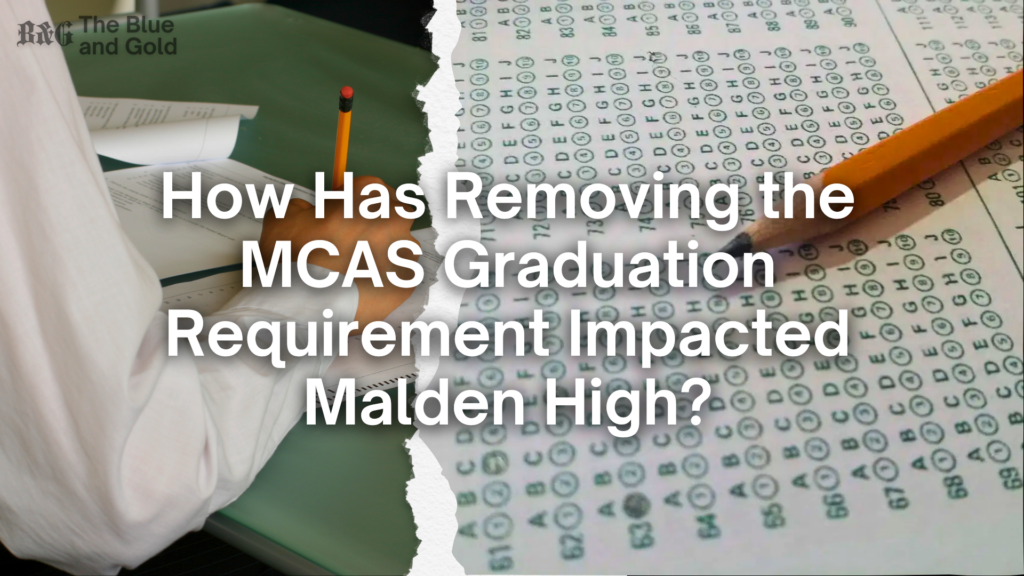
Jaslie Fang also contributed into this article.
As the end of the school year nears—students begin planning potential travel plans, relaxation, or time spent with friends—anticipation for summer break runs rampant through the halls of Malden High.
As much as everyone wishes the final stretch of the school year would be more merciful academically, that is not the case due to mandatory standardized testing, forcing students to postpone their summer excitement for when school is concluded.
The Massachusetts Comprehensive Assessment System (MCAS) is a set of standardized tests that are taken across the state in grades 3-8, as well as the 10th grade. The three-hour tests are meant to examine students’ skills in Mathematics, English Language & Arts, and Science. Yet, as simple as its intentions seem, the MCAS is arguably one of the more controversial topics of discussions in terms of education standards in Massachusetts.
MCAS was originally implemented in 1998 as part of the Massachusetts Education Reform Act, aiming to ensure that students across the state met certain academic standards. The test was designed to assess proficiency in core subjects and identify areas where schools needed improvement. Over time, it became a key factor in measuring school performance and readiness for college. However, as education priorities shifted, debates about the necessity of MCAS as a graduation requirement arose, ultimately leading to its removal.
The tensions ranged from when the exam became fully digital in the spring of 2018—raising concerns about certain students being left behind—to concerns about the test’s overall relevancy. As a result, these debates have created mixed emotions among students and teachers about the exam.
Following the COVID-19 pandemic where school districts across the nation made a multitude of changes and new exceptions to their education systems to provide every student with the help that they need, many became vocal about their objections regarding MCAS being a graduation requirement for the vast majority of public schools in the state and how that requirement is outdated. “I think the MCAS test is not necessarily the best way to test students’ knowledge—I’ve never really found much use for it in general,” commented history teacher Courtney Braz.
As a result, the state was shaken to its core after the 2024 election as the ballot “Question 2: Elimination of MCAS as High School Graduation Requirement” was voted into existence and relieved students of having to pass the exam in order to receive a diploma.
“To be honest, I was so happy when this got voted in… In the lower grades [MCAS] is relevant, but [not] as high schoolers,” stated sophomore Naomi Yohannes. She further stated that “we should focus on things like the SAT and AP exams instead of MCAS because those show more about the student.”
As the sophomores tackled their final English MCAS, many were ecstatic, given they were one step closer to being done with MCAS forever. “I’m so glad that I got it over with because, before it became a law for MCAS to not be a graduation requirement, I was planning on studying going into it, but after it passed I didn’t care and just went into it,” stated sophomore Wongel Yohannes. She further emphasized how tests are simply not her strong suit.
Wongel’s perspective raises questions about how student motivation might change in response to the new system. Since MCAS scores previously influenced graduation eligibility, students had a clear incentive to perform well. Now, without that requirement, some may view the test as less important, leading to potential changes in effort and engagement.
As relieving as it may be for students, since this is the first official school year where MCAS is not a requirement, the test scores may not reflect students’ true capabilities as their desire to perform at their best level may not remain within every student. “I am not going to lie, it not being a graduation requirement made me try ten times less than I normally would, which is sad, but I’m definitely going to get out of that mindset for the rest of the tests,” expressed Naomi.
With many students already admitting that MCAS is not seen as an important factor anymore, concerns arise about their academic performance and whether they are performing to the same standards set by older students. However, current sophomores have been taking the MCAS for nearly their entire academic careers and know what it is like to perform while under the pressures of the requirement. Thus, this shifts the focus onto younger students and how this new addition to the education system will affect their learning.
“I don’t think the test is always reflective of a student’s abilities—there are too many factors at play for a once-a-year test. Students could be having a difficult week or a difficult day; they could get nervous about tests, and questions could be worded in a way that is difficult for them to understand. I think learning happens throughout the course of the year and it can’t totally be reflected in a yearly exam. Although, some aspects can be reflected—like general writing skills in essay prompts,” Braz explained.
“I think that people will not perform as well as they can because they think that if I do well or don’t, I’m still going to be able to pass which isn’t good, but depending on what the scores are even used for it may not even matter,” exclaimed freshman Hadassa Pierre-Rene, who added that “if the scores don’t match up with past ones, that won’t look good and might cause decisions to be reconsidered.”
Although Pierre-Rene emphasized that the test itself is “important,” she also recognizes that it is extremely stressful and can cause students to cram in last-minute studying, especially for STEM-related subjects. “My biology teacher was out, so we had a new teacher, and her teaching was different from before, so to adjust to that while studying was hard,” added Pierre-Rene.
As honest as students were about the MCAS, many also took into account that the exam affects teachers as well. “Although MCAS for me and many others is very stress-inducing, the scores will probably become less reliable since many people will just be guessing through it, and since they use the scores for government funding and other things it would affect our schools and teachers a lot and undermine their work,” expressed freshman Liliana Lin.
While concerns about the impact on teachers and school funding remain, some believe that removing MCAS as a graduation requirement allows for more meaningful ways to assess student readiness. “I think it is a positive thing for students to not have to take the MCAS in order to graduate high school. There are much better ways for educators to measure whether or not students are ready to move on to postgraduate life,” emphasized Braz.
However, she also acknowledged the potential consequences. “I do think that some students will not perform to the best of their ability because it is not a graduation requirement,” said Braz. “There are no ‘stakes’ in it for students, so I think many kids might choose not to spend their day stressing about an exam that doesn’t necessarily impact them directly—and I don’t blame them! I also think this trend will impact data for school districts as well—making it not as reliable as it was before.”
With MCAS no longer a determining factor in graduation, discussions have emerged about how this might affect a student’s preparedness for college or a career. Standardized testing has traditionally been used as a benchmark for academic readiness, and without MCAS scores, schools may need to explore other options for assessing student progress. Some districts may place greater emphasis on classroom performance or alternative assessments to ensure students are meeting necessary educational milestones.
However, Massachusetts is not the only state to reconsider the role of standardized testing in education. Several other states have reduced the weight of standardized tests in graduation requirements or replaced them with alternative assessments. Some states use other forms of evaluation, while others emphasize coursework and teacher assessments over standardized testing. Looking at these models could provide insight into how Massachusetts’ decision might shape the education system in the coming years.
The elimination of MCAS as a graduation requirement does not necessarily mean the end of standardized testing in Massachusetts. The state may continue using MCAS scores for school evaluations, funding decisions, or curriculum development. Additionally, discussions may arise about introducing new assessments that better align with evolving educational priorities. As education policy continues to shift, further changes to testing requirements and student assessment methods could be introduced in the future.





